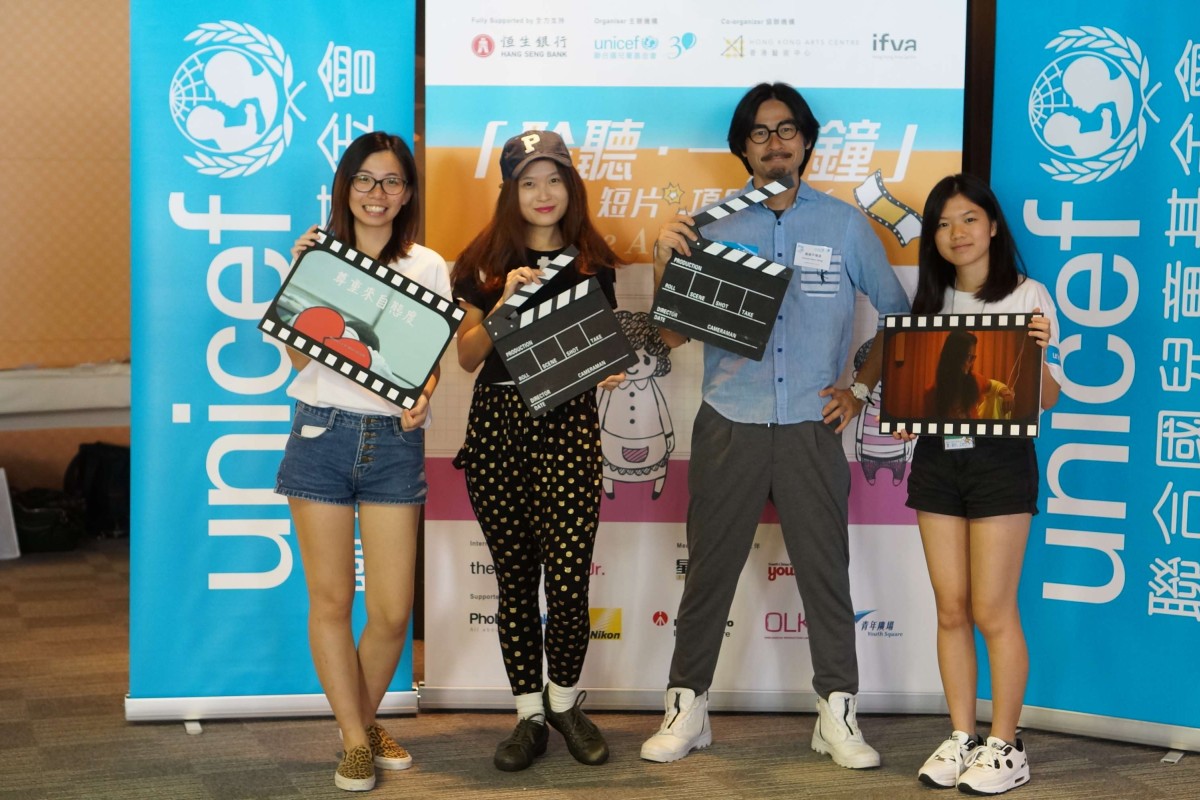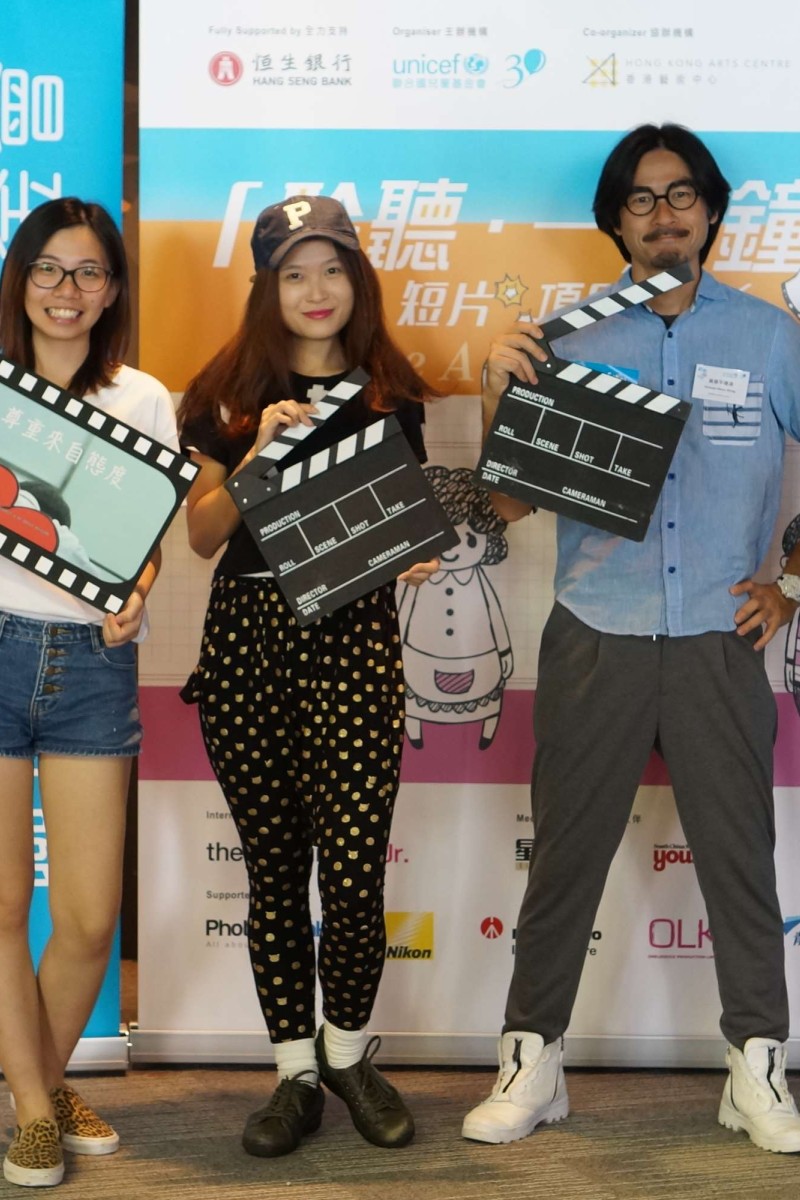 From left: Charlie Liu Sin-yi, director Heiward Mak Hei-yan, director Adam Wong Sau-ping and Luong Ying-ngai at the Unicef Make a Video 2016 launch ceremony.
From left: Charlie Liu Sin-yi, director Heiward Mak Hei-yan, director Adam Wong Sau-ping and Luong Ying-ngai at the Unicef Make a Video 2016 launch ceremony.Charlie Liu Sin-yi knew her mother would go bonkers when she told her that she didn’t want to study Business, Accounting and Financial Studies (BAFS) anymore. She prepared multiple copies of the dropout letter, in case her mother decided to tear it up.
“They said I didn’t take tutor classes, so of course I couldn’t handle it. They thought I was lazy,” Charlie says. She was terrified. Her parents wanted her to work in the financial sector – something she knew she wasn’t cut out for – but she didn’t know how to say “no” to them.
As the older sibling, Charlie never talked much about her feelings, and as she grew older, she realised she had no channel to express herself.
Two years ago, she found her voice through filmmaking at Unicef’s Make A Video (MAV) day camp, a five-day programme where she was shown how to make a one-minute clip that would allow her to express herself.
At first, the prospect of making a video all by herself was so daunting that after the first day she wanted to quit. But by drawing a storyboard, she was able break down her seemingly impossible idea into feasible steps. She was shocked to hear that her trainer loved her idea.
“At the end of the camp I was crying so hard I looked like a pig in all the pictures,” says Charlie, now a 19-year-old film student at Baptist University who freelances to pay for her own passion projects . “But I was so proud. It was an amazing feeling to realise that I had made something impossible, possible.”
What also became possible was her mother approving of her work as a filmmaker. “She’d nag me for always being out filming, but then she’d go share my videos on Facebook,” Charlie says. “I used to give up really quickly, and she can tell that filming is the one thing that gets me fired up.”
Form Five Kiangsu-Chekiang College (Shatin) student Luong Ying-ngai knows this feeling well. Since she joined MAV two years ago, the shy Ying-ngai has been refining her skills through photography and making videos for her school’s student union. She has also become the chairperson of the campus TV station, teaching younger students how to film.
Ying-ngai decided to join the contest again this year, because the theme “To Mum & Dad” was the perfect opportunity for her to dedicate a clip to her father, who passed away three years ago. “Sometimes when I volunteer with children, I hear them complaining about how much they hate their parents,” she says. “It’s heartbreaking. Why don’t they cherish what they have now, before it’s too late? I want children to know that they shouldn’t take their parents for granted.”
This year’s MAV contest will be judged by Hong Kong Film Award-winning filmmakers Adam Wong Sau-ping (The Way We Dance) and Heiward Mak Hei-yan (Love in a Puff).
Filmmaking has become more accessible to teenagers, but Mak says the art of storytelling has remained challenging. Especially for a one-minute clip, students need to be concise about their messages. Mak recommends writing down your brainstorming process to help streamline your ideas and communicate them with your crew.
“Know what you can and cannot do,” Wong advises. “You need to be sophisticated in how you express your message in such a short time-frame. Make good use of metaphors, music and acting.”
One video submitted to the MAV contest last year was particularly impressive to the directors. It was simply shot, and used a lengthening stick as a metaphor for corporal punishment.
While it’s always good to reference other people’s work, Mak believes it’s important to stand firm in what you believe in, because telling stories that need to be told is both noble and important.
“A lot of times I turn on the TV and end up asking: ‘Is this what we really need to see?’ It’s frustrating,” Mak says.
“We’re living in confusing times, and many teens give up too easily. Making films is hard work, and even I’m not always successful. But I’ll keep doing this until I die, because every bit of our work is an important documentation of our society and the state that we’re in.”
Unicef Make A Video 2016 is accepting video submissions until August 21. Outstanding videos will be selected to be screened in public. Head to mav.unicef.org.hk for more details.
My time at the MAV workshop
I attended the MAV video production workshop that Unicef hosted in Youth Square on July 10. The workshop consisted of three sessions, which focused on brainstorming ideas for videos, shooting, and editing.
In the brainstorming workshop, director and scriptwriter SamAndy Cheung taught us to express ideas in “movie language”. To illustrate the “show, don’t tell” principle, he played the opening scene of 2010’s Wall Street: Money Never Sleeps. It showed that even without dialogue saying it, we understand the character has spent a long time in jail because when he is released, the prison guards give him back his “ancient” mobile phone.
Director and post-production director Lee Siu-lung then shared some shooting tips. Using a promotional video he made for the Hong Kong International Airport, he revealed some creative hacks he used to overcome constraints, like “faking” a sunrise by reversing a sunset shot.
Filming is never perfect, and director and scriptwriter Nero Ng Siu-lun showed us how editing helps cut corners while still effectively conveying a message within a short period of time.
This workshop not only sharpened my filmmaking skills, it also opened my eyes to the world of techniques and hidden meanings behind the stories and visual effects in movies.
YP cadet Cece Wong
